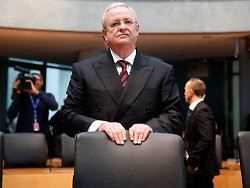Monday, May 31, 2021
Agreement in exhaust scandal
Winterkorn is supposed to pay millions to VW
Volkswagen’s supervisory board is convinced that Martin Winterkorn did too little to investigate exhaust gas manipulation. The ex-VW boss denies the allegations. According to a media report, there is now an agreement between the conflicting parties – including an eight-digit bill for Winterkorn.
Apparently an agreement between Volkswagen and several former board members is emerging in the exhaust gas manipulation affair. According to draft contracts, ex-VW boss Martin Winterkorn has agreed to pay around ten million euros to the company, reported the business magazine “Business Insider”. Corresponding agreements with the former top managers should be signed this week.
In the course of this, the automaker should have agreed with its manager liability insurance on the payment of a further 200 million to 300 million euros. Two insiders told the Reuters news agency that the VW supervisory board should discuss a compromise over the weekend, which will then have to be approved by the annual general meeting in July. Volkswagen did not want to comment on the report; a statement from a Winterkorn spokesman was initially not available.
At the end of March, the VW supervisory board had decided to demand compensation from Winterkorn and the former Audi boss Rupert Stadler for violating stock corporation law. The group also took recourse against four former board members of Audi, Porsche and VW for manipulating the exhaust gas. The supervisory board relied on investigations by a law firm, which in recent years evaluated several million documents, files, investigation files of the public prosecutor’s office as well as official and judicial proceedings and which itself conducted more than 1,500 interviews and interrogations.
The Supervisory Board was convinced that, from July 27, 2015, Winterkorn had failed to clarify the background to the use of impermissible software functions in diesel engines that were sold in the USA between 2009 and 2015. In addition, Winterkorn did not ensure that the questions posed by the US authorities in this context were promptly and truthfully and completely answered. Winterkorn, who led the car company until he resigned in September 2015, regretted the decision of the supervisory board. He had his lawyer reject the charge against him.
.
